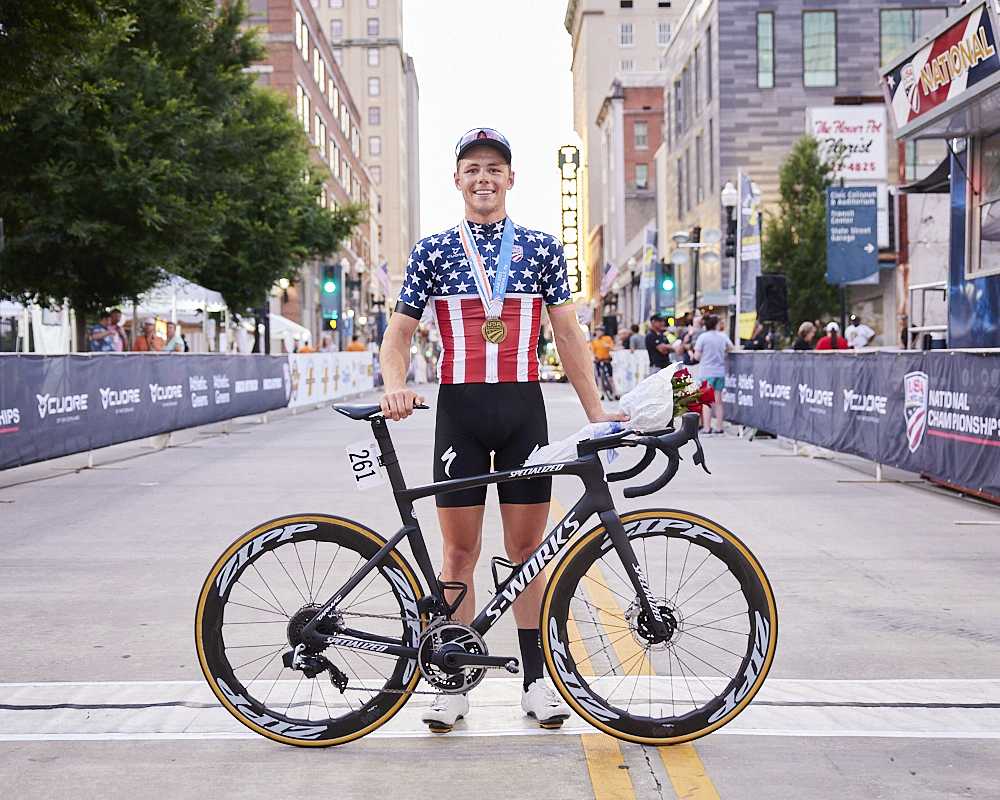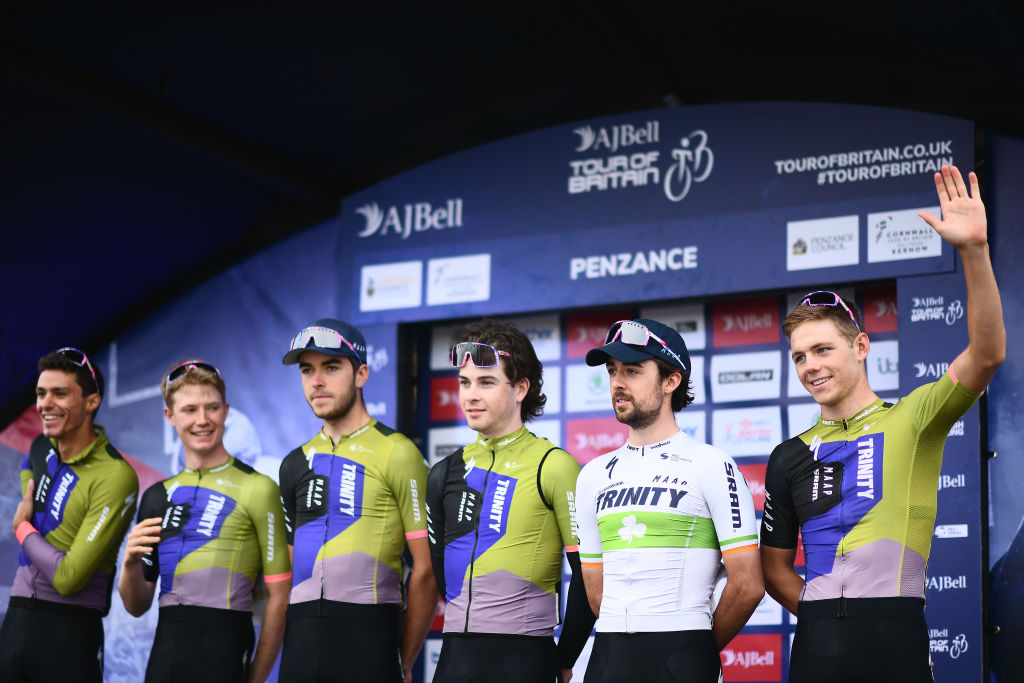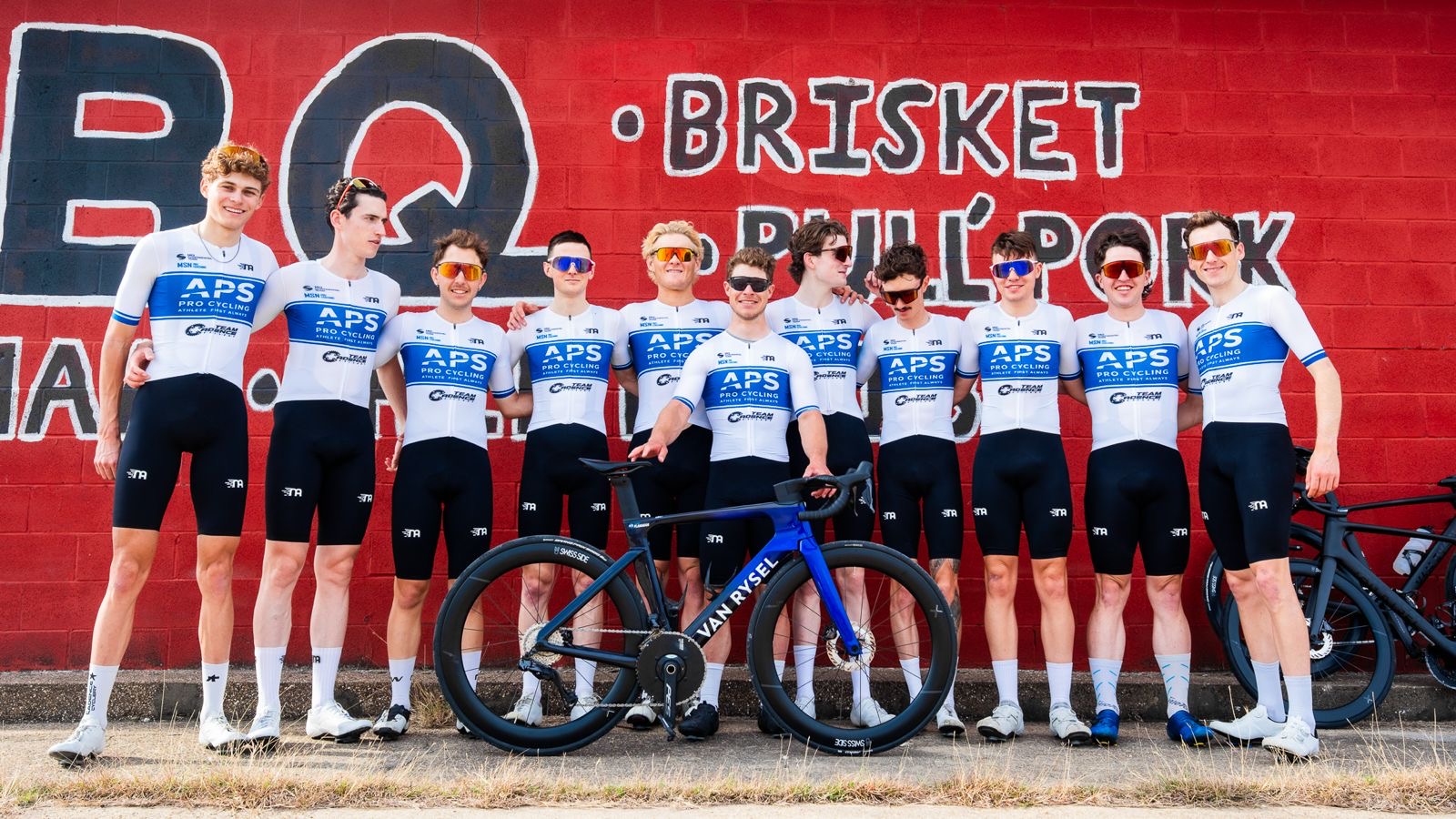Who is Luke Lamperti? The youngest US pro criterium champion with eyes on the WorldTour
Nevadan continues his development with Trinity Racing after promising 2022

Luke Lamperti (Trinity Racing) seemed to come out of nowhere when he became the youngest pro US criterium national champion at the USA Cycling Pro Road Championships in Knoxville in June. But if there were any doubts about the authenticity of his talent, the 18-year-old squashed them by coming fourth behind riders like Ethan Hayter, Giacomo Nizzolo and Dan McLay in a stage of the Tour of Britain.
He carried that form to the UCI Road World Championships where he finished 10th in the U23 road race but was later disqualified after the judges ruled he had crashed another rider on one of the cobbled climbs, an accusation he refutes in our interview.
Hailing from Sebastopol, California near Santa Rosa, one of the cycling hotspots in the US, Lamperti caught the cycling bug at a young age along with his older brother Gianni and claimed eight national titles before his 15th birthday. As a junior, he raced one season with the US National Team with current WorldTour pro Quinn Simmons (Trek-Segafredo) and Ineos Grenadiers' new recruit Magnus Sheffield. He placed 10th in the junior Paris-Roubaix as a 17-year-old.
Cyclingnews spoke with Lamperti after he made his debut in the stars and stripes as crit champion, placing second to Justin Williams in the Into the Lion's Den criterium.
Cyclingnews: Congratulations on the podium this past weekend in Sacramento as the US Pro Criterium champion, it must have been fun racing in the jersey.
Luke Lamperti: I don't get to do a lot of crits because obviously I'm spending most of my time in Europe now and so to be able to race in the jersey - and then I actually live an hour and 45 minutes away from Sacramento in Santa Rosa, so a lot of people I know were able to come and all of that, which was cool.
CN: Santa Rosa is quite a cycling hotbed - how did you get started racing?
The latest race content, interviews, features, reviews and expert buying guides, direct to your inbox!
LL: When I was really little my dad raced Motocross - I actually started on a dirt bike when I was really young. So I've always been on two wheels, but I was on a dirt bike until I was probably 12-ish and then I was doing both. I started training on a bicycle and I wasn't sure, so I was doing both of them but ended up on a bicycle full time from then until now.
CN: How did you balance training and racing with school?
LL: When I was young it was just fun. I would ride after school with my brother who raced at the time and it wasn't really like I had to go out and ride like nationals is coming - I just went out and rode with him, and then we had nationals like it was nothing serious at the time. We're kind of just having fun. And later on, when I started going to Europe, pretty young with USA Cycling, it was a little bit more serious. Balancing it with high school was hard, but I didn't want to give up that high school experience and go to full online school. So I stayed in high school, my teachers worked with me. It wasn't easy, a lot of the teachers were good about it.
I was able to balance that in my senior year - that probably would have been the hardest but it ended up being when COVID hit so it was all online anyway and racing was shut down as well. But once racing opened back up there was still that Zoom option - people were half and half back at school and on Zoom. So that worked out really well for me.
CN: I know that 2020 was a really hard year especially for the Juniors and under-23s because there was so little racing. How did you stay motivated during that?
LL: I did a lot of other stuff that whole year. At first, we were just going to miss the Classics trip, then it was by June, we'll do those trips, then we were going to have the World trip for sure, but then Worlds got cancelled. I wouldn't say I was just on it for the whole time because it's hard even if you're looking three months down the road at a race you have motivation, but it's not the same as when you have a race in a month. So I wouldn't say it was too hard. I still love riding. It's what I like to do, but I spent a lot of time on the mountain bike, doing gym work and riding with other people. I didn't really do any specific training for quite a while, just rode, keeping it unstructured and fun most of the year and then through winter not taking it too seriously.
CN: It was also hard for riders to get signed when there was no racing last year. How did you hook up with Trinity?
LL: Andrew McQuaid, who is my agent, also happens to run the team. And I had talked to quite a few other teams after my first year in the Juniors, and I had a connection with Specialized since I was young. They're based out here in Morgan Hill which is close, and so between the connection with them and Andrew, it was the most comfortable out of all the options I had last year and it kind of all just fell into place. I was fortunately able to do a whole season in Europe in my first year as a junior so I wasn't scrambling for teams. But the hardest thing was teams were unsure until really late whether they were going to be around. That was the hardest part. Teams didn't know if the season would be fully normal, or if their sponsors were going to renew after a whole year of not racing.

CN: You managed to get a good season in this year, what were the highlights of your season and what were the low points?
LL: I actually started on the mountain bike because there wasn't a ton of road stuff in the beginning of the year for the U23s. It was still a little bit unsure. So I started on the mountain bike and did a few of the HC races before the World Cups with Trinity's mountain bike team. Then I went to the road and at the beginning of the year [June] we had the baby Giro, which is a highlight for the team. The team had a really good ride there, that was the beginning of the season goal and then came back and did nationals. Nationals was a highlight for me, winning the crit there.
Then we went back over to Europe and as soon as I went back over, I had a small knee injury from hitting my knee on a table and it turned into kind of a bigger thing. I had some nerve damage in my knee and so I took two weeks off about two weeks before the start of the Tour of Britain.
So I was kind of a little bit of a low point and I was unsure about the Tour of Britain, but then I went from that straight into racing in Belgium to kind of gain as much fitness as possible right before Tour of Britain. That was another big goal of the team as we're a British team and it's a bigger race for us to get into. We had some good rides there from a team - I had one day where I was fourth, and we had some guys in breaks and some other good results, so that I was a highlight.
CN: The Tour of Britain was a pretty big deal and you were sprinting up there against guys like Giacomo Nizzolo and the other WorldTour guys.
LL: Yeah, that was definitely a big result and helped the conference a lot, just knowing that I can be at that level when things go right. Maybe I don't have the consistency this year but that's something to work towards next year. I know it's there. It's just putting it together more often.
CN: Tell me about your experience at Worlds - was that your first trip to Worlds?
LL: It was my first trip to Worlds - I was supposed to do Worlds my first year as a junior and I broke my collarbone two weeks before, and so I missed Worlds in Yorkshire, which would have been a special one for sure. My brother was there, so I would have been special to race Worlds with him, that was one of his last races, actually.
Then in my second year as a junior, it was cancelled. So this was my first year at Worlds – third time's the charm, I guess. It was a really cool experience, especially in Belgium. There was a ton of people there and it's kind of one of the first races in Belgium that was fully opened up for the year. So to have it there and have the crowds that were, there was definitely an amazing atmosphere.
CN: What was your role in the team?
LL: I was actually the leader of the under-23 team kind of, it was between me and Kevin Vermaerke. We lost a few guys due to crashes and a few other things. Overall it was a good race for me. I came in top 10, but then there were some other issues.
CN: I saw that you got disqualified, that had to have been hard.
LL: It was hard to swallow at first, but at the same time it's a hard situation because it was a race that had a lot of issues in this was kind of one that was pinpointed from another crash and I kind of got called out on it. I think they blew up the situation a little bit more than it needed to be. It's never good, obviously. I don't want my name to be that at all, I don't want to be known as a dirty rider.
The rider that it was involved with I've been riding with since I was 16 over in Europe at Tour of West Flanders, and I know really well and we're fine and everything is good. It was just kind of a situation where the UCI chose this situation as one they wanted to pinpoint from the race, to try and make racing safer. When this was probably one of the most dangerous races I've ever been a part of.
CN: Can you tell me what happened?
LL: Yeah. Basically, we came over the top of a cobbled sector and there was a Belgian rider who was coming from about second wheel, fading back, and I was coming from about sixth wheel coming forward, closing a gap to what I would say was about fifth wheel. He went to come back in line where I was and I was coming up with speed and we happen to touch and I leaned over a little bit.
We both kind of touched each other a little bit and then he went down because I was coming with more speed. He was one of the Belgian favourites, a really good rider. It was a tough one for everyone. They saw it as me purposely trying to take him out and it was far to go in the race - obviously, I'd never purposely take him out, it was just a racing situation that happens all the time, but it was one they didn't like this time.
CN: What do you have in the works for next season?
LL: I'm staying with Trinity and Specialized, so staying with a similar program and hopefully have a little bit more at the beginning of the year. I want to do all the under-23 Classic stuff - Roubaix, Gent-Wevelgem, Triptyque [Le Triptyque des Monts et Châteaux] - a lot of those races that I didn't get to do this year because we didn't have that full year - and have another year of development and not make the step up [to the WorldTour]. I think the step up would be a lot for me right now. Even though I can be successful, sometimes I think the consistency isn't there and it can be easy to just want to make the jump up to the WorldTour, but I think to stay down is really important for me, still. So staying with the same team and I'm really happy and the environment is good. And I think that's what helps you be successful.
CN: The juniors who went straight to the WorldTour have had mixed success.
LL: I think it just depends on who you are and where you're at. Some guys have had good success with it and some guys have struggled a little bit more with it, but I think it just depends where you're at and what you believe in at the end of the day. If you believe that you're ready and you back yourself, I think you can be successful doing it. It's also who you surround yourself with.
CN: As the youngest elite criterium champion, do you feel pressure to race crits?
LL: I definitely have a lot of fun doing crits - I had fun this last weekend in Sacramento, but we'll see if it fits in the schedule. I think I'll go back and do nationals because I'll be there. So I'll do that for sure and maybe some of the other big crits if I'm around in the States, but I can't say that they're the number one priority on my schedule. But I definitely would like to do a few in the jersey because they're a lot of fun and racing in the US is always special.
CN: Have you decided what kind of rider you are and what your ideal races will be?
LL: Yeah, I think ideally for me Classics is what I want to do. This year I did well in more pure sprints, but I would say a harder day is still better for me if it's a little bit more selective - like a selective group sprinter or small uphill sprint. It's still hard to say being young. I mean, I'm still figuring out where exactly I fit.
CN: A lot of riders do college first and race collegiate but you don't plan on that route?
LL: I'm doing classes online, actually, through the local junior college just to continue my general ed stuff, but I'm not taking the collegiate route as there's just not much opportunity in the collegiate side to make a living and really reach the top of the sport. If you have that four-year gap where you go to college and there's not high-level racing, I think you lose a lot. So I'm doing school online and then spending my time in Europe racing. So not going to a college in person.
CN: Are there any riders that you take inspiration from?
LL: I think the obvious answer, but the answer I'd give is Peter Sagan - just because of the path he made. He's built a brand around his name and he's the fan favourite. I saw him at Tour of California when he was almost my age or a couple of years older than I am now when he was doing really well there. I was really young when they came to Santa Rosa where I live and since then I've been a big Sagan fan.
CN: What is your long-term goal for cycling?
LL: My goal right now is to go to the WorldTour and see what I can do and see if I still love it. I definitely want to try to reach as high up in the sport as I can on the European scene. And I love racing there. If it doesn't work out, I don't know if I would stay in Europe to do really small stuff. But I do want to kind of see where I can go, and I have nothing to lose right now.

Laura Weislo has been with Cyclingnews since 2006 after making a switch from a career in science. As Managing Editor, she coordinates coverage for North American events and global news. As former elite-level road racer who dabbled in cyclo-cross and track, Laura has a passion for all three disciplines. When not working she likes to go camping and explore lesser traveled roads, paths and gravel tracks. Laura specialises in covering doping, anti-doping, UCI governance and performing data analysis.
